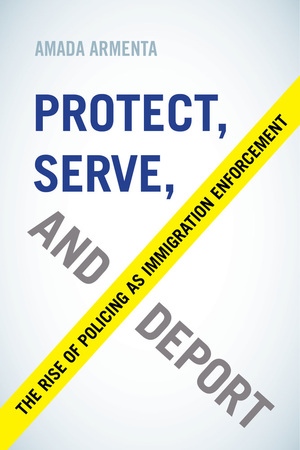Guest post by Amada Armenta. Amada is Assistant Professor of Urban Planning at the UCLA Luskin School of Public Affairs. Her research lies at the intersection of scholarship on immigration, law and society, and race and ethnicity. This is the second installment of Border Criminologies’ themed week on Dignity and immigration, organised by Vanessa Barker.
At the 2019 Law and Society Association meetings, we were asked to engage with the concept of ‘dignity’ (which was the theme of the 2019 conference) and discuss the extent to which ‘dignity’ informs our research. This was a question I had never considered. Upon reflection, however, I’ve arrived at two conclusions. First, ideas of dignity have been central to my research. Second, if not used carefully, deploying arguments that rely on immigrants’ ‘dignity’ may actually be counterproductive.
According to the dictionary, dignity is ‘the quality or state of being worthy, honored, or esteemed.’ A quick look at the political discourse about immigrants and refugees around the world reveals that many newcomers are not considered part of the national communities in which they live and are instead regarded as a ‘danger’ from which the polity must be protected. It is precisely because so many prospective migrants are considered unworthy that they are forced to risk their lives should they want to live in prosperous nations. Those who arrive in contravention of the law face legal and political systems that are designed to harm them. Living with an irregular immigration status negatively impacts immigrants and their families, harming their wellbeing and depressing their earnings over generations.

In my book, Protect, Serve, and Deport: The Rise of Policing as Immigration Enforcement, I argue that local law enforcement agencies play a crucial role in the immigration enforcement system by depositing immigrants in local jails where they can be identified for removal by immigration authorities. My fieldwork revealed that police arrested undocumented immigrants because immigrants could not comply with laws that police officers considered routine, such as the requirement to drive with a valid driver’s license. Since police arrested most undocumented immigrants for relatively minor violations, and these arrests could result in deportation, immigrant communities regarded policing as fundamentally unfair and believed that officers engaged in racial profiling. Police, on the other hand, resented these accusations, as they felt obligated to enforce state laws, even if those laws resulted in the disproportionate arrest of particular communities.
The tension between law enforcement agencies’ preference to enforce state laws, coupled with undocumented immigrants’ inability to comply with some of them, creates dilemmas for both law enforcement agencies and immigrant communities. Law enforcement agencies want cooperation from all segments of resident populations; immigrant communities must evaluate whether contact with the police jeopardizes their continued residence. In response to these dilemmas, cities and towns across the United States have declared themselves ‘sanctuaries’ for immigrants, vowing that their local law enforcement agencies will not cooperate or assist Immigration and Customs Enforcement with their immigration enforcement efforts. Reducing the harms that local law enforcement agencies willingly or unwittingly impose on undocumented immigrant communities also requires new and different laws. Decriminalizing immigration offenses and creating a path to a legal and permanent immigration status would also allow millions of immigrants to live more dignified lives—lives in which their work is not criminalized, their travel is not restricted, and/or they need not live with the knowledge that they could be arbitrarily arrested, deported, and separated from their families.
As we advocate for policies that would benefit undocumented immigrants, however, we often fall into the trap of trying to convince people that immigrants are worthy of dignity and respect. To combat stereotypes about immigrants’ criminality, we rely on tropes that highlight immigrants’ best qualities-- they work hard, they provide for their families, and they do not commit ‘real’ crimes. However, in our attempts to legitimize immigrants, to convince people that they ‘deserve’ policies that would be less harmful, we inevitably leave people out. We may champion the most ‘worthy’ and exceptional immigrants at the expense of those for whom it is more difficult to advocate, such as those with criminal convictions or prior deportation orders. We also privilege those who have the good fortune of living in the national territory, with no regard for future migrants who have not yet arrived. While demanding a legal immigration status for those who currently find themselves ‘outside’ the law is important insofar as it would improve the lives of millions of families, it does little to dismantle the immigration system which harms many. As such, it virtually guarantees that future immigrants will endure the same impossible circumstances that today’s immigrants face.
Any comments about this post? Get in touch with us! Send us an email, or post a comment here or on Facebook. You can also tweet us.
__________
How to cite this blog post (Harvard style)
Armenta, A. (2019) The ‘Dignity’ Trap. Available at: https://www.law.ox.ac.uk/research-subject-groups/centre-criminology/centreborder-criminologies/blog/2019/09/dignity-trap (Accessed [date])
Share:








